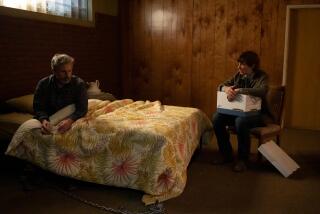Book Review : The Doctor’s Wife Has Been Lost in an Amnesiac Past
Uncharted Places by Nora Johnson (Simon & Schuster: $17.95; 332 pages)
Although “Uncharted Places” officially begins with Dinah Jones Wakefield and her surgeon husband, Willy, living in voluntary exile on the tiny Caribbean Island of St. Petin, the actual opening of the novel happens 14 years earlier, when Dinah finds herself outside the subway station across from Bloomingdale’s with no idea how she got there.
Covered with cuts and bruises, dressed in a T-shirt and jeans, both of which have seen better days, she has a few dollars in her pocket but no clue to her identity or the events that preceded her appearance “disgorged from the depths of the earth by some gigantic IRT birth pain.”
Amnesia is no laughing matter, but at first Johnson’s tone is so deftly ironic that Dinah’s predicament seems more diverting than ominous. At this point, her problems could be solved by a credit card. After a few days of wandering around the city, hoping for a clue to her past, Dinah is staring into the windows of an upper East Side flat, hoping that the copper pots, the cat on the window sill and the hanging plants might trigger some useful memory.
Covers for Chrissie
Observed by the householders, she’s quickly apprehended by a security officer; then surrounded by curious neighbors, one of whom notices she’s wearing a charm bracelet with the name Dinah on one of the ornaments.
After a few restful days in the hospital, subsidized by a psychiatrist interested in “genuine amnesiacs,” she agrees to move into an apartment with the psychiatrist’s ditsy girlfriend, Chrissie, who is supposed to be at Sarah Lawrence, learning to combine marriage with a career. In return for shelter, Dinah will cover for Chrissie, who hasn’t attended a class since she met Dr. Portoff and decided the career part wasn’t for her.
Even though this assignment keeps Dinah from becoming a bag lady, it’s hardly either satisfactory or permanent, and when Chrissie’s dodge is discovered by her parents, Dinah is back to square one--an unperson in a rough job market. Desperate, she calls the woman who had offered her room and board in return for her amnesia story on the night of her arrest in the East 60s. That person is Sally Pendleton, a lesbian writer who turns out to be a far more demanding house mate than Chrissie. Though Dinah copes with this situation for a while, providing the novel with some of its more satiric scenes, her heart isn’t in Sally’s book or related projects.
When she providentially meets Dr. Willard Wakefield, a hand surgeon who has perfected a means of reattaching severed fingers, Dinah falls instantly and completely in love. Wakefield, whose first wife had a mental breakdown and left him to cope with two young children, is enchanted with Dinah, who eagerly accepts full responsibility for his household. She’s the perfect wife for a busy surgeon--grateful, undemanding, efficient; a Galatea awaiting Pygmalion’s expert touch. Dinah seems the diametric opposite of his first wife, the complex and neurotic Liz, who could never stop talking about her childhood.
As long as Dinah has no memory, the Wakefields’ life runs smoothly, the even tenor or their days only faintly disturbed by Dinah’s quixotic friendship with Liz, who not only recovers her sanity but enlists Dinah in a novel business venture. At this point, the already thickened plot acquires the consistency of Sakrete. You step into it at the risk of becoming embedded forever in the complications caused by the Wakefields’ Haitian housekeeper Emerelda, who is a voodoo high priestess, determined to free Dinah from the spirits who have robbed her of her past.
Structured in Flashbacks
Recounted mainly by Dinah, with some assistance from her physician husband, the novel is structured in flashbacks. In the course of telling the story, Johnson explores voodoo rituals, presents a splendidly satiric view of the sort of people who wind up on Caribbean beaches, takes off on hospital politics, examines the fragile relationships in step-families, and finally confronts Dinah’s tangled emotions when her past resurfaces.
Though any one of these issues could supply more than enough plot for a novel, Johnson has weighted her book with so much incident that the characters can barely thread their way through the clutter. While “Uncharted Places” refers specifically to the blanks in Dinah Wakefield’s memory, the title also inadvertently suggests a frail boat lost at sea, listing from an overload of passengers and ballast.
More to Read
Sign up for our Book Club newsletter
Get the latest news, events and more from the Los Angeles Times Book Club, and help us get L.A. reading and talking.
You may occasionally receive promotional content from the Los Angeles Times.






